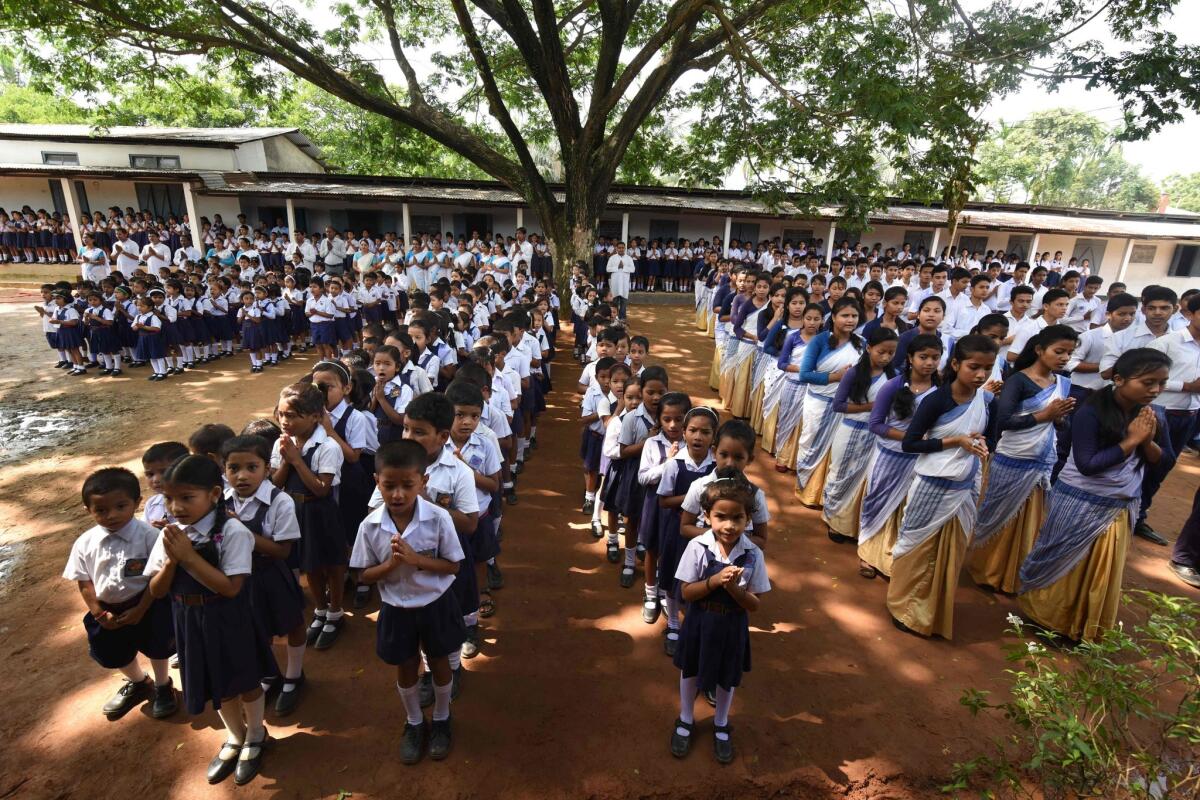In India, a journalistic expose leads to a criminal complaint — against the journalists

- Share via
Reporting from MUMBAI, India — When a respected Indian newsmagazine published an 11,000-word investigative report detailing how members of the country’s most powerful Hindu organization had attempted to indoctrinate 31 tribal girls in a way that amounted to human trafficking, it expected authorities to investigate.
The journalists did not expect that they would become the targets of the investigation.
Members of India’s governing Bharatiya Janata Party, or BJP, filed a criminal complaint last week against the magazine, Outlook, and reporter Neha Dixit. They alleged that Dixit’s story spread communal hatred because of a reference to ethnic conflicts in the remote northeastern border state of Assam, from which the girls had been taken.
Press freedom advocates said it was the latest example of an accelerating crackdown against journalists in India whose reporting prompts criticism of influential politicians and power brokers.
The fallout from the story, published July 29, continued over the weekend when the magazine’s editor, Krishna Prasad, was fired. Prasad’s replacement, Rajesh Ramachandran, said the decision had been made last month and was not connected to the controversy over the story.
Prasad, publisher Indranil Roy and Dixit, a freelance reporter, were accused in the Aug. 4 complaint of violating an Indian law against speech that promotes “disharmony or feelings of enmity, hatred or ill will between different religious, racial, language or regional groups or castes or communities.” The colonial-era law has been used in the past to stifle controversial speech or publications.
The complaint was filed with police in Assam by S.C. Koyal, an assistant solicitor general of the Indian government, and Bijon Mahajan, a spokesman for the BJP. Officials with the BJP have denied the wrongdoing detailed in the story.
Under Indian law, police must investigate the complaint before formal charges can be filed.
Prasad said in an interview that the complaint — and the fact that it was filed in Assam, more than 900 miles east of the magazine’s base in New Delhi — was part of a strategy to scare journalists and make it more difficult for them to fight the charges.
“It is essentially aimed at creating fear amongst journalists who might want to write about these things,” Prasad said.
Critics said the complaint focuses on one paragraph in the story while ignoring the child trafficking accusation against members of the Hindu nationalist organization, the Rashtriya Swayamsevak Sangh, or RSS, the parent organization of the BJP.
Dixit’s reporting found that in 2015, members of the RSS and its affiliates took 31 girls from their homes in tribal communities in Assam, one of India’s least developed states. The RSS activists promised the girls’ parents they would receive a better education in the states of Punjab and Gujarat.
The story, titled “Operation Baby Lift,” found that the real aim was to indoctrinate the girls, some of whom were as young as 3, in the organization’s Hindu nationalist ideology. Parents have not been allowed to see the girls, who are still with the RSS, the article said.
The Assam State Commission for the Protection of Child Rights, an advocacy group, said the act amounts to child trafficking.
The Committee to Protect Journalists, a New York-based advocacy group, joined Indian press federations in condemning both the complaint and the increasing attacks on journalists. Instead of initiating an inquiry into whether the contents of the article are authentic, journalists say, the government resorted to a classic case of shooting the messenger.
How Indian censors tried to cut a gritty film about drug abuse »
Dixit has been subjected to abuse on social media by supporters of the BJP and its standard-bearer, Prime Minister Narendra Modi. Many have called for her arrest.
India likes to tout itself as the world’s biggest democracy, but it ranked 133rd among 180 countries in the latest press freedom index compiled by the advocacy group Reporters Without Borders.
Indian press groups cited the recent attempt by the central government and some state governments to stop advertising in Rajasthan Patrika, a private media group in the western state of Rajasthan, because of accusations of antigovernment bias in its reporting. Several journalists in rural India have been killed or gone missing over the last year, with colleagues and family members saying they were targeted for their work.
In a column for the online portal Newslaundry, senior journalist Madhu Trehan called on readers to stand by journalists.
“It is now for the public to decide whether they will support the true democratic spirit of the constitution,” she wrote. “Otherwise there will be no questions raised and you won’t get the answers that the establishment owes you.”
Parth M.N. is a special correspondent.
ALSO
Why an Indian activist plans to give up her 16-year hunger strike
Boko Haram releases new video of abducted Chibok girls
More to Read
Sign up for Essential California
The most important California stories and recommendations in your inbox every morning.
You may occasionally receive promotional content from the Los Angeles Times.










